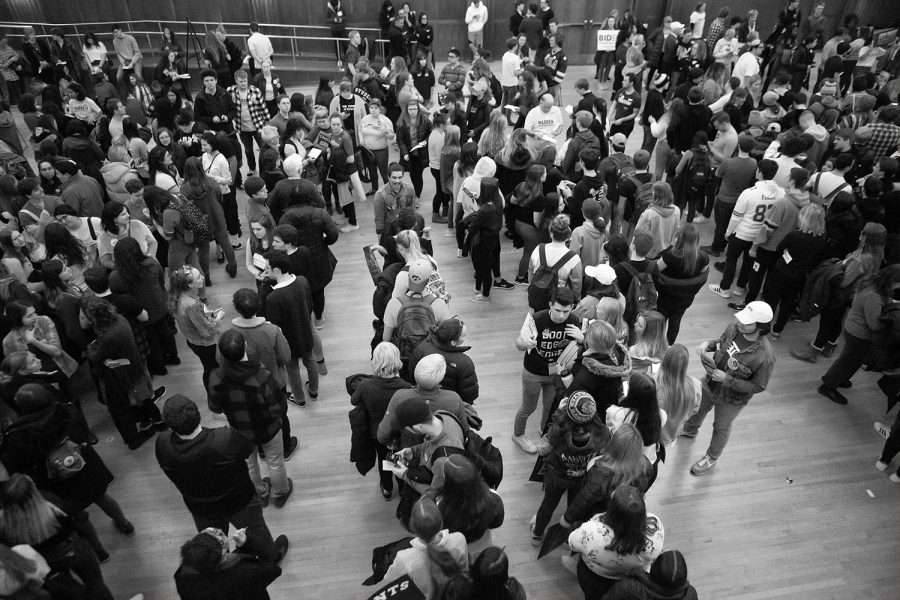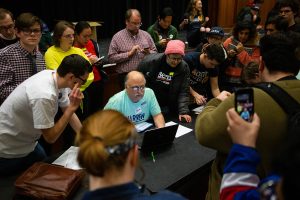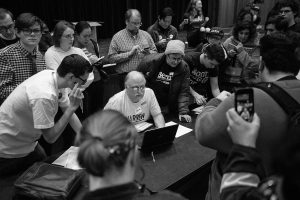Accessibility issues persist in 2020 Iowa caucuses
Some Iowans say the caucuses in their current form are not accessible enough to caucusgoers who have disabilities, despite Iowa Democratic Party measures aimed at addressing such concerns.
University of Iowa students form lines during the caucus at the Iowa Memorial Union on Monday Feb. 3, 2020.
February 4, 2020
At a shopping-mall caucus site in North Des Moines, many Iowans caucused for the first time at the satellite caucus location designed to be inclusive of caucusgoers with disabilities — but disability advocates say measures taken by the Iowa Democratic Party did not do enough to accommodate those with disabilities.
Reforms passed by the Democratic National Committee in 2018 required all state caucuses and primaries to have an absentee voting option, or otherwise take significant steps in accommodating those with disabilities.
Reyma McDeid, executive director of the Central Iowa Center for Independent Living, hosted a satellite caucus location in Des Moines.
“We had a boatload of folks with us yesterday who had never caucused before, particularly members of the deaf community, who had never caucused before,” McDeid said. “As heartwarming as it was to facilitate a caucus that attracted people to engage in a process they had never participated in before, that’s really heartbreaking to me.”
McDeid said she designed the caucus to be inclusive, rather than accessible, which places the burden on caucusgoers to ask for accommodations.
“An inclusive event very intentionally centers disability in the planning of the event — making sure the venue is wheelchair accessible, making sure the bathrooms are ADA compliant,” McDeid said. “Taking it a step further, making sure that a quiet room is available for people who might experience autism or other forms of neurodiversity.”
The DNC had concerns about the accessibility of the Iowa caucuses, so the state created satellite caucus locations in order to increase the amount of precinct options available to caucusgoers.
Anne Matte, the communications and outreach director for Disability Rights Iowa, said that the Iowa Democratic Party opened requests for accommodations on Jan. 14, and the Republican Party opened its accommodation requests on Jan. 16.
As we get closer to caucus night, we're excited to announce that for the first time ever, we're offering a Request for Accommodation process!
Learn more about the process and submit a request here: https://t.co/ZGNDjpVEoL#CripTheVote #IACaucus
— Iowa Democrats (@iowademocrats) January 14, 2020
Matte said the two-week window Iowans had to request accommodations at precinct sites was not an adequate time frame.
“This method of doing individual accommodation requests is not enough, Matte said. “It is not a systemic enough addressing of the issue — this is putting out little kitchen fires as they pop up and ignoring the wildfire outside.”
According to Matte, around 300 requests for accommodations were made, though she said there would have been more requests for if there was a longer window for requests.
Matte said she suffers from severe migraines, and had trouble getting accommodations at her precinct location in Des Moines.
“I worked to advocate for people with disabilities at my caucus site, where I requested a darkly lit room and was given a brightly lit room with windows to the hallway,” Matte said. “I was eventually able to use the dark library for a friend of mine who has agoraphobia who was also at the caucus, but they did not adequately provide my accommodation.”
University of Iowa student Teagan Roeder was a precinct chair at the UI’s Field House. Roeder, who is on the autism spectrum, said the event with 490 people was overwhelming and left the caucus early, tainting his view of the caucuses overall.
“As an individual on the autism spectrum, with all the chanting all the yelling, all the people gathered up into one room all trying to figure out what’s going on people are trying to keep the motivation up,” Roeder said. “It’s noisy, it’s heated, it’s argumentative. And that’s not an environment for people like me.”
Roeder said he does not think the Iowa caucuses should continue in their current state, and that a primary system would be more accessible to voters.
“It’s disappointing to me that the Democratic Party would value the money we get from the caucuses versus having an accessible election,” Roeder said.
McDeid said she does not believe the causes can be truly accessible to all Iowans in their current form.
“Ultimately, [the caucus] is not a process that works for 21st Century Iowa — it’s still excluding entire populations of people, McDeid said. “With a primary option, voting early, voting by mail, voting from home are options that open up the possibility for many voters to participate, much more than we see from caucuses.”






